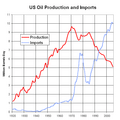1973 oil crisis facts for kids
The 1973 oil crisis was a big event that started on October 17, 1973. It happened when a group of countries called the Organization of Arab Petroleum Exporting Countries (OAPEC) decided to stop selling petroleum (oil) to certain nations. This decision was made because of the Yom Kippur War, a conflict where Israel was fighting against Syria and Egypt.
The countries that supported Israel, like the United States, Canada, their friends in Western Europe, and Japan, were the ones who stopped getting oil from OAPEC. This ban on oil sales, called an embargo, lasted until March 1974.
Around the same time, another group of oil-producing countries, OPEC, also decided to make oil more expensive around the world. They had tried to talk with big oil companies, but it didn't work out. Because many industrial countries relied heavily on oil, these price increases really hurt their economies. It also slowed down business and everyday activities. The countries affected by this crisis then tried to find new ways to rely less on oil.
Contents
Why the Oil Crisis Started
The main reason for the 1973 oil crisis was a war called the Yom Kippur War. This war began in October 1973 when Egypt and Syria attacked Israel. Many Arab countries supported Egypt and Syria in this conflict.
OAPEC's Decision to Stop Oil Sales
The Organization of Arab Petroleum Exporting Countries (OAPEC) is a group of Arab nations that produce and sell oil. They used oil as a way to put pressure on countries that supported Israel during the war. So, they announced that they would no longer ship oil to the United States, Canada, Western European countries, and Japan. This was a big shock because these countries needed a lot of oil to keep their factories running, cars moving, and homes heated.
OPEC Raises Oil Prices
At the same time, the larger group called OPEC (Organization of the Petroleum Exporting Countries), which includes many of the OAPEC members, decided to increase the price of oil. They had tried to negotiate with major oil companies earlier, but those talks failed. Since OPEC supplied a lot of the world's oil, their decision made oil much more expensive for everyone.
How the Crisis Affected the World
The sudden stop in oil supply and the big jump in oil prices caused many problems around the world. Countries that relied on oil for everything from transportation to manufacturing faced serious economic challenges.
Impact on Economies
The higher oil prices meant that it cost more to make products, transport goods, and even just drive a car. This hurt the economies of many countries, making things more expensive and sometimes leading to job losses. People had to pay more for gasoline and heating their homes.
Countries Look for New Solutions
To deal with the crisis, many countries started looking for ways to use less oil. They also tried to find new sources of energy or new places to buy oil from. These efforts led to long-lasting changes in how countries thought about energy.
Japan's Smart Response
Some countries managed to adapt well. For example, Japan quickly focused on making things that used less oil. Japanese car companies started building automobiles that were much more fuel-efficient. This meant they could travel further on less gasoline. Soon, car companies in other countries also began making more fuel-efficient cars. Japan also put more effort into producing electronics like radios and televisions. These smart moves helped Japan's economy recover well after the oil crisis.
Long-Term Effects
The problems caused by the 1973 oil crisis continued for many years, even into the early 1980s. Oil prices remained high until 1986. This crisis showed the world how much it depended on oil and encouraged countries to think about energy differently. It led to more research into alternative energy sources and better ways to save energy.
Images for kids
-
Gasoline ration stamps printed by the Bureau of Engraving and Printing in 1974, but they were never used.
-
This gas station in Potlatch, Washington, was abandoned during the crisis and later used as a revival hall.
See also
 In Spanish: Crisis del petróleo de 1973 para niños
In Spanish: Crisis del petróleo de 1973 para niños
 | Kyle Baker |
 | Joseph Yoakum |
 | Laura Wheeler Waring |
 | Henry Ossawa Tanner |











